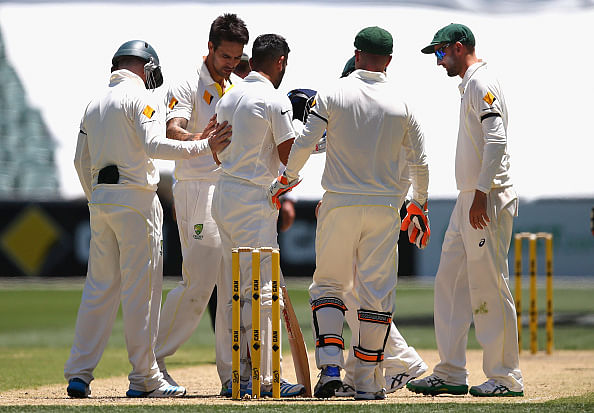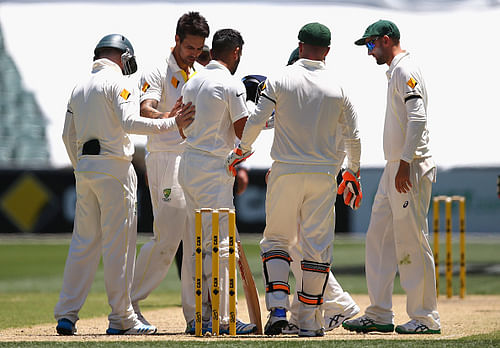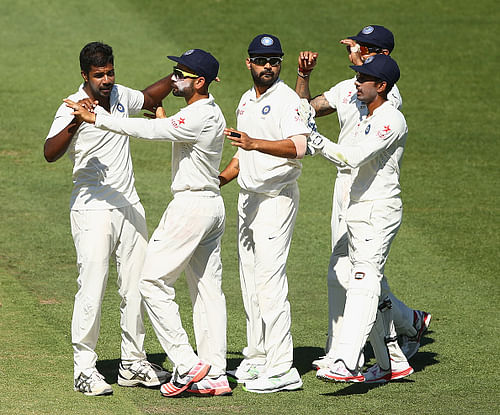
"Come on" cricket, Phillip Hughes wants you to smile

Existence of diversity is imperative for a self-perpetuating ecosystem. That is why a carnivorous animal that predates on living beings is as important as a herbivorous animal. The contrived human intellect and the hypocritical moral values laid out on mankind coax us into visioning the herbivorous animals as being pious and noble and the carnivorous animals as being ruthless, oppressive and wicked.
If we manage to make a world sans predators while strictly adhering to the moral principles that we have been indoctrinated with, the world would be inundated with excessive population of species that would eventually bring down the biota of earth to graveyards.
Our life is no different from biology. Evilness is as important as piousness. If everyone adheres to the teaching of Gautama Buddha and Mahatma Gandhi and shapeshift into irreproachable individuals, it will result in a lack of competition, which would result in a lack of motivation. Life would be lifeless and would turn out to be a mundane rendition of a voyage from life to death.
Following the untimely demise of Phillip Hughes, cricket encapsulated itself in a cloak of benevolence. Of course, a death of that sort can be a bolt from the blue, which can leave the players close to him in a deeply entrenched trauma and their lives permanently scarred. Cricket had its son robbed at a tender age. It should have never happened. But it has come to pass.
The Australians would have had difficulties in returning to normalcy. That is understandable. But what about the rest of the cricketing world playing a brand of enervated cricket that was worse than fixing matches?
Cricket needs to pay tribute to Hughesy, which they did: there were black armbands worn, cricketers showered with prayers and condolences all over the world, many fans had their profile pictures changed in honour of Hughes, there were #putyourbatout campaigns and players playing with the name ‘Phil’ printed on their shirts.
There were homages paid to the young Australian when batsmen reached 63. He was named as the 13th man in Australia’s team against India, and Cricket Australia declared Hughes 63 not out instead of 63 retired hurt. That was the best valediction any man born on the planet can have.
On the other hand, isn’t eschewing from bowling bouncers, not celebrating wickets and showing contrived emotions and false postures an insult to the game?
New Zealand v Pakistan – Was cricket played for the sake of it?
In a Test match between New Zealand and Pakistan, the usual raucous appeals became polite requests and a fall of a wicket became as mundane as a run for a batsman. Batsmen ceased celebrating milestones, and victories became formalities that had no connection with the human psyche. To sum it up, cricket was played for the sake of playing.
It is natural that a death begets misery. Depending upon your degree of closeness, it could even lead to your life come crashing down with grief. But does that mean you need to shun the happiness that comes your way? If life presents yourself with an opportunity to be happy and let go of the tragic memories, shouldn’t we embrace it? Why do we need to suppress happy emotions to exude sadness, just because the popular culture demands glum faces to treat death?
I vehemently oppose the firmly rooted conviction that not being sad is an insult to the deceased.
The slew of excuses and the 63 ad nauseam
Would Hughes have asked his Aussie mates to be easy on batsmen and handle them with care? I am pretty sure the chirpy youngster would have asked Mitchell Johnson to go and bounce batsmen out, ring some chin music and smell blood.
The death also became a butt of a slew of excuses for defeats. Alastair Cook, England’s captain, cited Hughes’ demise as the cause for their defeat against Sri Lanka, while, to be honest, the truth was that their batting had failed to come to terms with Sri Lankan conditions.
I felt exasperated to scroll through my newsfeed in social media, with self-professed mathematicians coming up with a number of quixotic equations, all of which ended up on number 63. A batsman scores a run, and there were these Ramanujams playing roulette with mathematical operations to bring out the number 63. In the beginning, I was overawed, but soon those social media ramblings became an ad nauseam.
It was reprehensible that most were done to yield the ultimate goals of getting more followers and likes.Soon the mourning became a fashion and trend than anything else.
Was it the kind of tribute a young cricketer who was ensnared by fate deserved? Wasn’t playing cricket at the best spirit the ultimate honour cricket can give to its beloved son?
When the cricketing world turned into a utopia with people showing what looked like feigned concerns for their opponents, the ultimate essence of a sport was lost. What is a sport if it lacks competition, rivalry, wrath and passion?
Action shifts to Down Under
The boredom of seeing pious and noble cricket being played around the world made me look forward to the clash of two cricketing giants Down Under. I expected cricket to be played with a temperament that we all love. I wanted bouncers to be bowled without no scruples and life to go on routinely.
Mitchell Johnson did fire a venomous bouncer at Virat Kohli, who was struck on his helmet in the first ball he faced. Sanity has prevailed, I thought. However, contrary to my expectations, within a fraction of a second, Kohli was swarmed by all the Australian fielders and the umpires.
When a batsman is hit, it is customary for the close in fielders to check out on the batsman. But doesn’t it seem far-fetched and artificial to have the entire Aussie brigade surrounding Kohli? Weren’t they contrived emotions that brought in a mini hiatus?
Cricket became dull and tedious. The sanity exhibited by the players destroyed the actual zest of a sport, which is the sole reason for why we are addicted to it. Even Hughes would have become sick of it. But whenever life goes out of hand on earth, anointed ones are sent by God to redeem mankind. In cricket, Hughes sent his own messiah in the form of Varun Aaron.
Aaron – the messiah

When the going got boring, the Indian pacer rose from oblivion and walked out of darkness ushering our sport back to life. Third ball of the 33rd over of the 3rd innings of the Test, Aaron flung a fast, full-length ball that castled David Warner’s wicket. The 25-year-old catapulted himself into a sprint and squealed “COME ON!”.
It was a “come on” from Hughes to plead cricketers to let cricket go on; it was a “come on” to stop mourning and start playing; it was a “come on” to kick off the real India-Australia match. Unfortunately for the messiah, it was a no-ball. Warner returned with his version of “come-on”.
Harsh words were exchanged, leading to altercations and judicial interventions: And our beloved sport was back at its original form. The rivalry has begun and the wrath that characterises the Border-Gavaskar trophy has kicked off.
I generally despise sledging that do not have any tactical intentions. But the come-on-gate incident was a blessing from the heavens for cricket.
Cricket is a gentlemen’s game, but it is not a game played by sages. Cricket will become cricket only if emotions are expressed and sentiments are conveyed. A batsman’s tearful eyes after scoring a century or a bowler's expletives after getting a fifer is what makes us all connect to the core of the game. It is the antagonism between fans and teams that keep us glued to televisions during the Ashes and India-Pakistan encounters.
A rivalry should never become a bromance in the field of play. Hughes met with a freakish accident. Rarities are rare because they do not happen often. Hughes may very well be the last one to bid adieu to the world after being hit by a bouncer.
Calls to ban bouncers and reluctance to bowl bouncers will kill the flavour of cricket. People are killed in motor accidents. But does the family of a victim stop using any form of transport? There has been a plethora of flight crashes this year; have they created a significant dent in the air traffic? Then why should cricket be mired in loathing about a bouncer that killed a player? Why should cricket stave off aggression?
Australians will definitely have reluctance in bowling bouncers. But the heat produced during the first Test should be adequate to get over the untoward incident and pursue their brand of cricket. Hughes desperately wants cricket to smile. Can cricket do the needful?